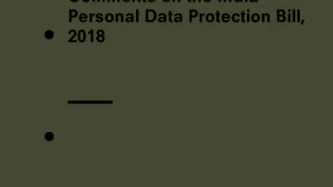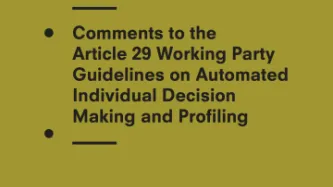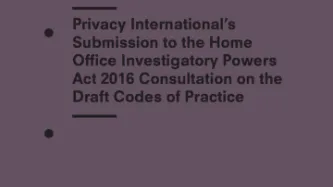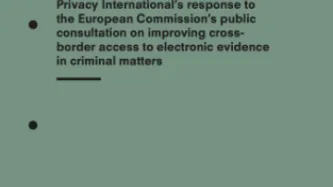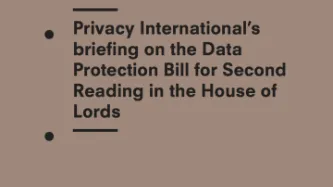Advanced Search
Content Type: Explainer graphic
You can also read a more detailed explainer about facial recognition cameras here.
Content Type: Explainer graphic
You can also read a more detailed explainer about IMSI catchers here.
Content Type: Explainer graphic
You can also read a more detailed explainer about mobile phone extraction here.
Content Type: Press release
Consumer groups, NGOs and industry call jointly for the Council of the EU to advance ePrivacy reform
On Monday 3 December, a coalition of more than 30 consumer groups, NGOs and industry representatives sent a letter to EU Ministers and the Council of the EU calling for the conclusion of the negotiations on the reform of the ePrivacy legislation.
The letter was sent prior to yesterday's (4 December) meeting in the TTE Council, with signatories sharing concerns over the slow progress of the negotiations in the Council of the EU despite the repeated scandals that demonstrate the clear and…
Content Type: Advocacy
In response to the consultation on ‘Gender perspectives on Privacy’ by the UN Special Rapporteur on the right to privacy, Privacy International presented a submission with its observations.
Content Type: Advocacy
Privacy International welcomes the effort by the Government of India to reaffirm its commitment to upholding and respecting the right to privacy, and for noting the need to regulate the processing of personal data as essential for the protection of privacy through the adoption of a data protection law.
The urgent need for this legislation has been validated in the Supreme Court decision regarding the Aadhaar Act, which stipulates the need for a robust data protection regime. …
Content Type: News & Analysis
This month Brazil adopted a new data protection law, joining the ranks of more than 120 countries which have adopted such legislation, providing individuals with rights against the exploitation of their personal data. But after a veto from the Brazilian president, the law lacks an independent authority in charge of its application, which can severely undermine its impact.
When drafting data protection bills, one of the most important and often politically contentious issue tends to be their…
Content Type: Advocacy
We welcome the effort by the Pakistani Ministry of Information Technology and Telecommunications to regulate the processing of personal data in Pakistan, and take measures to guarantee the right to privacy as guaranteed under Article 14(1) of the Constitution: “[t]he dignity of man and, subject to law, the privacy of home, shall be inviolable.”
This legislative development is crucial and timely as Pakistan continues to embrace innovative governance initiatives and deploy data-intensive systems…
Content Type: News & Analysis
Image was found here.
As part of Privacy International’s mission, we aim to take the issues emerging from our research and that of our partners to new spaces of debate and to the attention of stakeholders at the national, regional and international level.
In April 2018, Privacy International was able to engage for the first time with the African Commission on Human and People's Rights (ACHPR) at its 62nd Ordinary Session, which took place in Nouakchott, Mauritania.
The right to privacy does…
Content Type: Advocacy
At the core of data protection debates, there is a power play between empowering individuals to control their data and empowering those who use (or want to) use their data. By regulating data processing, it provides avenues for individuals to exercise their rights if there is any unlawful interference in this power play.
It is crucial for any regulatory framework to be centred around the protection of human rights, autonomy and dignity, and therefore essential to ensure that…
Content Type: Advocacy
On 6 March 2018, Privacy International participated in an interactive dialogue with the UN Special Rapporteur on the right to privacy at the 37th Ordinary Session of the Human Rights Council in Geneva. We highlighted the growing trend of governments embracing hacking to facilitate their surveillance activities, and recommended the development of a human rights analysis of government hacking for surveillance purposes, with the view to forming specific…
Content Type: Press release
Privacy International and Open Rights Group have submitted a response to the Consultation on establishing a UK Privacy and Civil Liberties Board.
Content Type: News & Analysis
11 November 2014
With a draft United Nations General Assembly resolution on the right to privacy in the digital age expected to come in a mere few weeks, negotiations on this key international document have reached a critical stage.
This year's resolution creates a significant opportunity to build upon two important developments at the United Nations – the 2013 UN General Assembly (UNGA) resolution on the right to privacy in the digital age, and the July 2014 authoritative…
Content Type: Press release
26 March 2015
The UN's top human rights body, the Human Rights Council, today has passed a landmark resolution endorsing the appointment of an independent expert on the right to privacy. For the first time in the UN's history, an individual will be appointed to monitor, investigate and report on privacy issues and alleged violations in States across the world.
The resolution, which appoints a Special Rapporteur on the right to privacy for an initial period of three years, was spearheaded…
Content Type: Advocacy
Privacy International's comments to the Article 29 Working Party Guidelines on automated individual decision-making and profiling are here.
Content Type: News & Analysis
13 June 2016
"State capacity to conduct surveillance may depend on the extent to which business enterprises cooperate with or resist such surveillance” notes the Special Rapporteur on freedom of expression in his report on the role of the private sector to respect human rights in the digital age. The Special Rapporteur will present its findings and recommendations to the Human Rights Council on Thursday.
It is no longer sufficient for companies to simply point the finger at…
Content Type: Advocacy
The powers set out in the Investigatory Powers Act are wide ranging, opaque and lacking in adequate safeguards. The Government have now published updated Draft Codes of Practice for certain parts of the Act. Unfortunately, the Codes do little to solve the Act’s problems. Instead, they add little transparency, occasionally expand powers, and undermine some of the limited safeguards in the Investigatory Powers Act. These Codes demand close scrutiny. The unusually short timeframe for…
Content Type: Advocacy
The feedback in this document was submitted as part of an open Request for Information (RFI) process regarding the document created by The IEEE Global Initiative for Ethical Considerations in Artificial Intelligence and Autonomous Systems ("The IEEE Global Initiative") titled, Ethically Aligned Design: A Vision for Prioritizing Human Wellbeing with Artificial Intelligence and Autonomous Systems.
Content Type: Advocacy
Thornsec is a piece of software developed by Privacy International’s Tech Team which is an automated way to deploy, test, and audit internal and external services for an organisation, saving a lot of time and creating a sustainable security model. We are using this software to run all of Privacy International’s services – website, calendar, project management tools, Tor hidden services, VPNs. The whole system runs on two servers and the whole cost is around US$1000 to set up.
Thornsec is…
Content Type: Advocacy
This briefing covers Part 3 (law enforcement processing) and Part 4 (intelligence services processing) of the Data Protection Bill.
Content Type: Advocacy
Privacy International has responded to the European Commission’s consultation on the interoperability of EU information systems for borders and security.
The Commission is currently looking at ways in which various border control and policing EU databases and IT systems can be connected to share and exchange more data.
The plans raise a number of concerns as highlighted by Privacy International in our response. These relate to significant potential harms associated with…
Content Type: Advocacy
On 23 October 2017, Privacy International contributed to the public consultation of the European Commission on improving cross border access to electronic evidence for criminal investigation. The consultation raises important questions, particularly in relation to preserving human rights protection and safeguards as national police forces seek digital evidence in other jurisdictions.
The EU is not the only inter-governmental organisation seeking to address the complex jurisdictional…
Content Type: Advocacy
Privacy International wishes to raise serious concerns regarding the proposal to expand immigration records to include social media handles, associated identifiable information and search results. Specifically, in relation to the current request for comments Docket Number DHS 2017 0038, we object to the Department for Homeland Security proposal to update record source categories to include “publicly available information obtained from the internet”, “commercial data providers” and from “…
Content Type: Press release
Privacy International, in partnership with 30+ national human rights organisations, has today written to national intelligence oversight bodies in over 40 countries seeking information on the intelligence sharing activities of their governments.
Countries may use secret intelligence sharing arrangements to circumvent international and domestic rules on direct surveillance. These arrangements can also lead to the exchange of information that can facilitate human rights abuses,…
Content Type: Advocacy
Privacy International has today submitted comments to a U.S. government consultation on whether the US Department of Homeland Security (DHS) should keep the social media details of individuals travelling to the US in so-called “Alien Files” documenting all immigrants.
We’ve urged that they don’t, and that they review and stop all similar social media surveillance by the DHS.
The systematic surveillance of social media is an increasingly dangerous trend …
Content Type: Advocacy
Privacy International's response to the inquiry by the House of Lords Select Committee on Artificial Intelligence.
Content Type: Advocacy
Privacy International welcomes the aim of this Bill (Data Protection Bill), “to create a clear and coherent data protection regime”, and to update the UK data protection law, including by bringing the EU General Data Protection Regulation (GDPR) and the Data Protection Law Enforcement Directive (DPLED) - into the UK domestic system. This is Privacy International’s briefing on the Data Protection Bill for second reading in the House of Lords
Content Type: Press release
While welcoming the objective of the Bill, Privacy International has sent a briefing to the House of Lords and a letter to Minister of State for Digital, Matt Hancock MP, outlining key concerns and recommendations. The Bill's stated aim is “to create a clear and coherent data protection regime”, and to update the UK data protection law, including by bringing the EU General Data Protection Regulation (GDPR) and the Data Protection Law Enforcement Directive (DPLED) - into the UK domestic system.…




